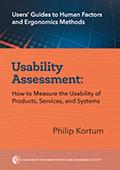
Credit: Human Factors and Ergonomics Society
The Human Factors and Ergonomics has just released Usability Assessment: How to Measure the Usability of Products, Services, and Systems, a concise volume for anyone requiring knowledge and practice in assessing the usability of any type of product, tool, or system before it is launched.
Volume 1 in the new HFES series "User's Guides to Human Factors and Ergonomics Methods," the book, by Philip Kortum, PhD, provides a brief history and rationale for conducting usability assessments and examples of how usability assessment methods have been applied, takes readers step by step through the process, highlights challenges and special cases, and offers real-life examples (a corporate Web portal and a high-security voting system). By the end of the book, readers will have the knowledge and skills they need to conduct their own usability assessments without requiring that they read textbooks or attend workshops.
Amazon's Alexa User Research Senior Manager Arnold Lund notes, "Kortum has again demonstrated his ability to capture a broad area in our field and summarize it in a practical, usable way. Part of the special 'seasoning' through the book is Philip's clear point of view and his ability to engage the reader in some of the tough issues in usability assessment that are still being debated today."
Usability Assessment is geared toward undergraduate and graduate students; practitioners; usability professionals; human-computer interaction professionals; researchers in fields such as industrial design, industrial/organizational psychology, and computer science; and those working in a wide range of content domains, such as health care, transportation, product design, aerospace, and manufacturing.
Philip Kortum is a faculty member in the Department of Psychology at Rice University in Houston, Texas. Prior to joining Rice University, Kortum worked for more than 15 years in the defense and telecommunications industries, where he researched and helped field award-winning user-centered systems. He is the author of more than 80 peer-reviewed papers and conference proceedings and holds 49 U.S. patents.
###
Paperback and Kindle versions are available for purchase at https://www.hfes.org//Publications/ProductDetail.aspx?ProductID=171. To obtain a copy for preparing a book review for publication, please contact HFES Communications Director Lois Smith (310/394-1811, [email protected]).
Books in the "Users' Guides to Human Factors and Ergonomics Methods" series provide accessible, instructional titles detailing the background, rationale, detailed procedures, and outcome analyses associated with methodological procedures used in the investigation of human involvement in complex sociotechnical systems. Each book contains enough detail to be a self-contained guide and reference work for the method, offering an "expert over your shoulder." Future volumes in the series address questionnaire development, workload, risk analysis, task analysis, and knowledge elicitation.
The Human Factors and Ergonomics Society is the world's largest scientific association for human factors/ergonomics professionals, with more than 4,500 members globally. HFES members include psychologists and other scientists, designers, and engineers, all of whom have a common interest in designing systems and equipment to be safe and effective for the people who operate and maintain them. "Human Factors and Ergonomics: People-Friendly Design Through Science and Engineering."
Media Contact
Lois Smith
[email protected]
310-349-1811
@HFES
http://hfes.org
############
Story Source: Materials provided by Scienmag





